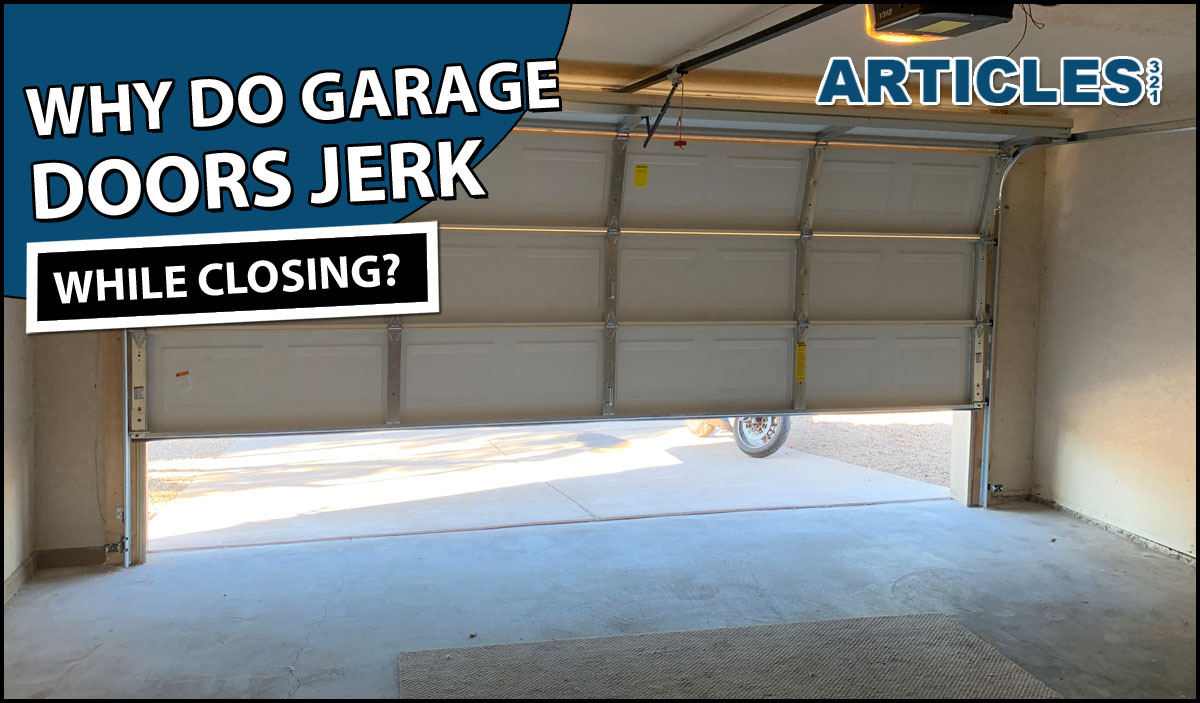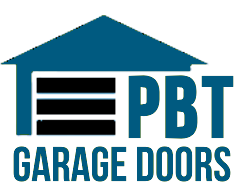Have you ever wondered why your garage door shakes when you close it? It can be quite a puzzling problem, but fear not! In this article, we will explore the common causes of a garage door that shakes when closing and provide you with some insights on how to address this issue.
When you press that button to close your garage door, you expect it to glide down smoothly and quietly. But when it starts shaking and rattling, it can be both annoying and concerning. So, what could be causing this unsettling movement? Let’s delve into some possible culprits!
There are a few reasons why your garage door might shake when closing, ranging from simple fixes to more complex issues. From imbalanced doors to worn-out components, we’ll uncover the likely suspects and help you understand how to tackle them. So, let’s get started and put an end to your garage door’s shaky escapades!

Common Causes of a Garage Door that Shakes When Closing
Garage doors are an essential part of any home, providing convenience and security. However, if your garage door shakes when closing, it can be a cause for concern. The shaking can be accompanied by loud noises, and it may indicate underlying issues that need to be addressed. In this article, we will explore the common causes of a garage door that shakes when closing and provide insights on how to fix them.
1. Misaligned Tracks
One of the most common causes of a shaking garage door is misaligned or improperly installed tracks. Over time, the tracks can become loose or get out of alignment, causing the door to wobble as it moves. This misalignment can lead to increased friction and strain on the door’s rollers and opener system.
To fix this issue, start by visually inspecting the tracks for any noticeable gaps or deviations. Use a level to ensure that the tracks are properly aligned and adjust them if necessary. Tighten any loose bolts or screws that hold the tracks in place. If the problem persists, it may be necessary to bring in a professional to realign the tracks or replace any damaged components.
2. Worn Rollers
Another common culprit behind a shaking garage door is worn or damaged rollers. Rollers are vital for the smooth operation of the door, as they allow it to glide along the tracks. Over time, these rollers can deteriorate due to normal wear and tear or lack of regular maintenance.
Inspect the rollers for signs of wear, such as cracks, chips, or flattened surfaces. If you notice any damage, replace the affected rollers with new ones that are compatible with your garage door system. Lubricating the rollers regularly with a silicone-based lubricant can also help reduce friction and prevent further damage.
3. Loose or Damaged Hardware
Shaking during the closing of the garage door can be caused by loose or damaged hardware. The frequent up and down motion can cause nuts, bolts, and screws to become loose over time, affecting the door’s stability and balance. Additionally, worn or damaged hinges or brackets can contribute to the shaking sensation.
Check all the hardware components, including hinges, brackets, and fasteners, and tighten any loose connections. If you notice any signs of damage, such as cracks or breaks, replace the affected parts. Regular inspections and maintenance can help prevent hardware-related issues and ensure the smooth operation of your garage door.
4. Imbalanced or Tensioned Springs
The springs of a garage door play a crucial role in its movement and balance. If the springs are imbalanced or under too much tension, it can cause the door to shake when closing. This imbalance may also lead to uneven wear and tear on other components of the door.
Inspect the springs for signs of damage or wear, such as gaps, breaks, or rust. It is crucial to note that garage door springs are under high tension and should only be adjusted or replaced by trained professionals. Contact a reputable garage door repair service to assess and correct any issues with the springs.
5. Damaged or Warped Panels
In some cases, a shaking garage door may be the result of damaged or warped panels. If a panel is bent or dented, it can disrupt the smooth operation of the door and cause it to shake when closing. Additionally, weather-related factors such as temperature fluctuations or excessive moisture can contribute to warping.
Inspect the panels for any visible signs of damage or warping. If you identify any problem areas, consider replacing the affected panels to restore the door’s structural integrity and improve its performance. Regular maintenance, including repainting and sealing the panels, can help prevent damage and prolong the lifespan of your garage door.
6. Insufficient Lubrication
Proper lubrication is crucial for the smooth operation of a garage door. If the moving parts, such as hinges, rollers, or springs, are not adequately lubricated, it can result in increased friction and resistance. This friction can cause the door to shake when closing and put unnecessary strain on the opener system.
Regularly lubricate all the moving parts of your garage door with a silicone-based lubricant. Be sure to clean off any existing lubricant before applying a fresh coat. This simple maintenance task can significantly reduce friction and improve the overall performance of your garage door.
7. Opener Malfunction
In some cases, a shaking garage door may be caused by a malfunctioning opener system. Issues with the motor, gears, or other components of the opener can disrupt the smooth movement of the door and result in shaking or vibrating.
If you suspect that the opener is the culprit behind the shaking, it is best to consult a professional garage door repair service. They have the expertise and knowledge to diagnose and fix problems with opener systems. Depending on the severity of the issue, they may need to repair or replace the opener to restore the proper functioning of the garage door.
Further Insights on Garage Door Issues
Now that we have explored the common causes of a garage door that shakes when closing, let’s delve deeper into some additional topics related to garage door issues. Understanding these aspects can help you prevent potential problems and ensure the long-lasting performance of your garage door.
1. Regular Maintenance Tips
To keep your garage door in optimal condition and prevent vibrations or shaking, it is essential to perform regular maintenance. Here are some tips to help you maintain the smooth operation of your garage door:
1. Inspect the door and its components regularly for any signs of wear, damage, or misalignment.
2. Lubricate all moving parts, including rollers, hinges, and springs, at least once a year.
3. Clean the tracks of debris, dirt, and obstructions that can impede the door’s movement.
4. Check and tighten all hardware components, including nuts, bolts, screws, and cables.
5. Test the balance and alignment of the door regularly by disconnecting the opener and manually operating it.
Following these maintenance tips can help you identify potential issues early on and take appropriate measures to address them.
2. Benefits of Professional Garage Door Maintenance
While regular DIY maintenance is essential, scheduling professional garage door maintenance at least once a year offers additional benefits:
1. Expertise: Garage door professionals have the knowledge and experience to accurately diagnose and fix various issues, ensuring the safety and functionality of your door.
2. Preventive Measures: Professionals can identify potential problems before they escalate, saving you from costly repairs down the line.
3. Warranty Compliance: Regular professional maintenance can help you maintain the validity of any warranties associated with your garage door and its components.
Investing in professional garage door maintenance can give you peace of mind, knowing that experts have thoroughly inspected and serviced your door to ensure optimal performance.
3. Signs it’s Time for a Garage Door Replacement
While regular maintenance can prolong the lifespan of your garage door, there may come a time when replacement is necessary. Here are some signs that indicate it’s time for a new garage door:
1. Frequent and Costly Repairs: If your garage door requires frequent repairs that are becoming increasingly expensive, it may be more cost-effective to invest in a new door.
2. Excessive Noise and Shaking: If your garage door consistently makes loud noises or shakes even after maintenance and repair efforts, it may be a sign of a deteriorating door.
3. Outdated Design and Technology: If your garage door is outdated or lacks modern safety features, upgrading to a new model can enhance security and improve curb appeal.
Consulting with a trusted garage door professional can help you assess the condition of your door and determine if replacement is the best course of action.
In conclusion, a garage door that shakes when closing can be a cause for concern. Misaligned tracks, worn rollers, loose or damaged hardware, imbalanced springs, damaged panels, insufficient lubrication, and opener malfunctions are common culprits behind this issue. Regular maintenance, professional inspections, and timely repairs can help prevent and address these problems. By addressing these issues promptly, you can ensure the smooth and safe operation of your garage door for years to come.
Key Takeaways
- A garage door that shakes when closing can be caused by various factors.
- Loose or worn-out rollers may cause the door to shake when closing.
- Imbalanced or misaligned tracks can result in shaking during the closing process.
- A broken or damaged torsion spring can cause the door to shake when closing.
- Insufficient lubrication on the moving parts of the door can lead to shaking when closing.
Frequently Asked Questions
In this section, we’ll address some common causes of a garage door shaking when closing.
Why does my garage door shake when I close it?
There are a few potential causes for a shaking garage door. One common reason is worn-out rollers or hinges, which can create friction and cause the door to shake. Another common cause is an unbalanced door, where one side is heavier than the other. This can lead to an uneven closing motion and result in shaking. Lastly, if the garage door springs are damaged or worn out, it can cause the door to shake when closing. It’s important to address these issues promptly to prevent further damage and ensure smooth operation of your garage door.
How can I determine if my garage door is unbalanced?
You can perform a simple test to check if your garage door is unbalanced. Start by disconnecting the door from the opener, then manually open the door halfway and let go. If the door stays in place, it’s likely balanced. However, if one side starts to descend or the door falls abruptly, it indicates an imbalance. In such cases, it’s best to contact a professional technician who can adjust the springs or perform any necessary repairs to restore balance and prevent shaking when closing.
What should I do if I notice worn-out rollers or hinges?
If you notice worn-out rollers or hinges on your garage door, it’s important to replace them as soon as possible. Worn-out rollers can create friction, causing the door to shake and eventually leading to more severe damage. Similarly, damaged hinges can affect the smooth operation of the door. You can try lubricating the rollers and hinges to see if that improves their performance. However, if the problem persists, it’s best to consult a professional technician who can assess the situation and recommend the appropriate replacements.
Can I fix the shaking of my garage door springs on my own?
Fixing garage door springs is a complex and potentially dangerous task that should be left to professionals. Garage door springs are under high tension, and attempting to repair them without the proper knowledge and tools can result in serious injury. It’s important to hire a trained technician who can safely assess the condition of the springs and replace them if necessary. They will have the expertise to handle the process safely and ensure the springs are properly balanced, eliminating any shaking when closing the garage door.
Are there any preventive measures I can take to avoid garage door shaking?
Regular maintenance is key to prevent garage door shaking. Inspect the rollers, hinges, and springs regularly and replace any worn-out or damaged parts promptly. Lubricate the moving parts to reduce friction and ensure smooth operation. Additionally, keep the door balanced by regularly testing it and addressing any imbalances promptly. By taking these preventive measures, you can extend the lifespan of your garage door, minimize shaking issues, and avoid costly repairs in the future.

Summary
If your garage door shakes when closing, there are a few common causes to consider. One possibility is that the tracks are misaligned or dirty, so make sure to check and clean them regularly. Another cause could be worn-out rollers, which can be replaced to solve the problem. An unbalanced door or loose hardware can also make the door shake, so be sure to keep an eye on these issues. Lastly, if the motor or the cables are damaged, it’s best to call a professional to fix it.
In summary, a shaking garage door can be caused by misaligned tracks, worn-out rollers, an unbalanced door, or damaged motor/cables. Regular maintenance and prompt repairs can keep your garage door running smoothly and prevent any further damage.

